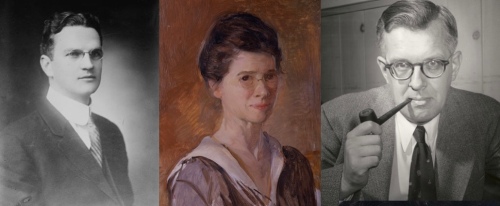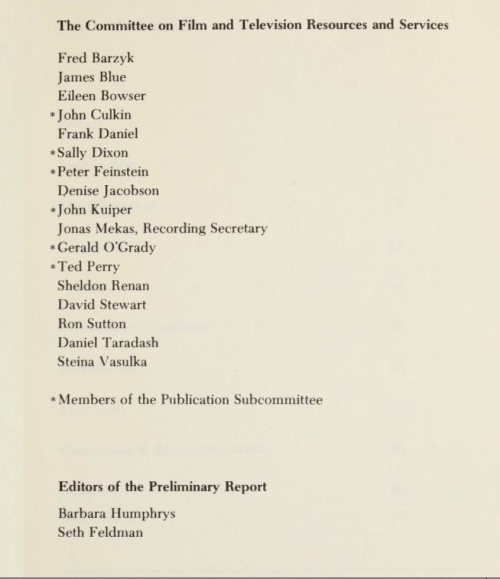The theme of the 2018 Oregon Film History Conference was the minor cinemas of Oregon. Keynote speaker Will Vinton discussed his roots in experimental animation, one of the minor cinemas. Leading up to Will’s talk, which he shared with Randy Finley, were talks by Ben Truwe, Worth Mathewson, Ellen Thomas, Monte Wolverton, Sheldon Renan, Dennis Nyback and Anne Richardson. For the first time, we included a bibliography/filmography in the registration packet.
But perhaps one bibliography is not enough.
For people who new to using a cross disciplinary, humanities based lens to explore Oregon film, yes, there is additional reading, if you would like.
Here are six useful resources:

Left to right: William T. Foster, Anna B. Crocker, Andries Deinum.
1914
Vaudeville and motion picture shows : A study of theaters in Portland, Oregon by William Trufant Foster
This astonishing document may be the Rosetta Stone which explains Portland’s pop strength. Covers the Board of Praise, curfew, 90% of 14 year olds, concern for safety on the way home, The People’s Institute, and Mary Frances Isom.
William T. Foster, Reed College president, with the aid of sixty community volunteers, investigated the charge that children were being harmed by live entertainment and/or movies. He finds the theaters not guilty.
1946
It Goes Deeper Than We Think: Reflections About the Role of Art in Education; Reflections, So to Say, About Scenes Observed and Lines Heard by A Minor Actor in A Drama Developing Meaning in Rehearsal by Anna B. Crocker
Anna B. Crocker, director of Portland Art Museum from 1909 to 1936, made a way out of no way for the fledgling Museum Art School by forging deep partnerships with Reed College, Multnomah County Library and Portland Public Schools. Her influence continues to guide Portland’s relationship to art and art education today. A titan.
In this self published essay, Crocker describes her work and discusses her approach.
Strange but true: Will Vinton and Bob Gardiner’s Oscar winning short, CLOSED MONDAYS (1974), appears to take place in a museum similar to the one Crocker helped design in 1932.
1965
Speaking For Myself: A Humanist Approach to Adult Education for a Technical Age by Andries Deinum
Andries Deinum, a self described “refugee from occupied Hollywood”, opened the first film school in the Pacific Northwest at PSU in 1969. The Center For The Moving Image served as a networking hub, not just for student filmmakers, but also for filmmakers in the community. One of those filmmakers was the young Will Vinton.
Speaking For Myself, a collection of essays which reflects the inclusive, inquiring nature of Deinum’s intellect, is now out of print. Fortunately, Brooke Jacobson is preparing a manuscript for publication which will reverse that.
Impatient people can access this book through Multnomah County Library’s Interlibrary Loan.

1974
“Film Community” by Will Vinton
Five months before the above photo was taken, Will Vinton wrote: “The growth and achievements of the past few years represent a phenomenal potential for the Portland area becoming a film center.” He also discusses the role of the audience, echoing William T. Foster‘s assessment of Portland theaters as spaces which build community.

1977
The independent film community: a report on the status of independent film in the United States by Committee on Film and Television Resources and Services, edited by Peter Weinstein. Contributors include James Blue (Jefferson HS ’49, UO ’53), Brooke Jacobson (PSU ’67), Sheldon Renan (Cleveland HS ’59).
In 1973, Sheldon Renan, director of Pacific Film Archive, proposed a national survey of existing resources for independent film. As part of the survey, a team of experts traveled across the country making onsite visits.
In the final report, published in 1977, the presence of the names of three Portlanders on the title page – Sheldon Renan, Brooke (at that time she used the name “Denise”) Jacobson, James Blue – testifies to the national impact of Oregon’s early investment in arts education.

Sheldon Renan attended Saturday classes at the Museum Art School, founded 1909; Brooke Jacobson is co-founder of the Northwest Film Study Center, which was (and is) fiscally sponsored by Portland Art Museum, founded 1892; James Blue, founding faculty member of American Film Institute & founding director of Rice Media Center, took classes at University of Oregon’s School of Architecture & Allied Arts, founded 1914.

1998
The Portland Story 1925-76/Northwest Animation: The Roots of Creative Variance. Society for Animation Studies Conference, October 1998 by Rose Bond
With this paper, Rose Bond became Portland’s first animation historian. Her analysis reaffirms the qualities first catalogued by Will Vinton in 1974, and provides more detail about this regional strength.

Top, left to right: Reed College president; director of Portland Art Museum; founder of PSU’s Center For The Moving Image. Middle, left to right: head of Will Vinton Studios; co-founder of Northwest Film Center; founding director of Rice Media Center (in Houston). Bottom, left to right: founding director of Pacific Film Archive (in Berkeley); founding director of PNCA’s Animation Institute.
It appears Oregon’s regional strength in film and animation cannot be separated from a parallel regional strength in art education.
I’m thinking this is exactly what Wendell Berry meant by “Essential wisdom accumulates in the community just as fertility builds in the soil.”
==============================================================
Next year’s fifth annual Oregon Film History Conference will take place on May 3, 2019. The 2019 Essential Texts post to follow!
==============================================================
Founded in 2007 by Anne Richardson and Dennis Nyback, Oregon Cartoon Institute uses new media, archival film, research, networking, and cross disciplinary discussion to explore Oregon film, animation, and print cartooning history. It has no brick and mortar presence, and always works in partnership with organizations which do.






